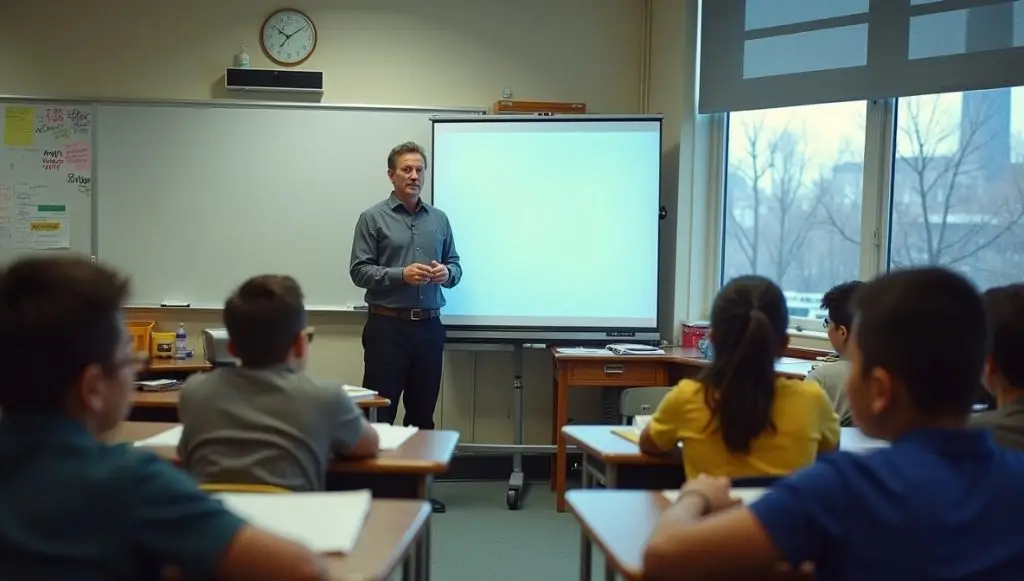Florida maintains some of the nation's strictest teacher background screening requirements. These are mandated by the Jessica Lunsford Act and enforced through FDLE Level 2 background checks. As of 2025, all K-12 education workers must complete comprehensive background screenings before classroom contact. Recent legislative updates have expanded scope and increased penalties for non-compliance.
Key Takeaways
- Florida requires Level 2 FDLE background checks for all K-12 education personnel, which include FBI fingerprinting, statewide criminal history, and sex offender registry searches.
- The Jessica Lunsford Act mandates that school districts must screen all employees and volunteers who have direct student contact, with rescreening required every five years.
- Processing times typically range from 3-5 business days for electronic submissions through authorized vendors, though delays can occur during peak hiring seasons.
- Disqualifying offenses include any felony involving violence, sexual misconduct, child abuse, drug trafficking, or crimes against minors, with mandatory permanent disqualification for specific offenses.
- Post-COVID legislative updates in 2023-2024 expanded background check requirements to include mental health personnel, virtual classroom monitors, and third-party educational technology vendors.
- Non-compliance penalties increased in 2024, with school districts facing fines up to $5,000 per violation and potential loss of state funding for systemic failures.
- Out-of-state teachers must complete Florida-specific background checks even with valid clearances from other states, as reciprocity agreements do not satisfy FDLE requirements.
- Conditional employment is permitted while background checks are pending, but candidates cannot have unsupervised student contact until final clearance is received.
Understanding Florida's Teacher Background Check Framework
Florida's approach to education worker screening represents one of the most comprehensive systems in the United States. The state's background check framework combines federal requirements with enhanced state-level provisions. Since implementation of the Jessica Lunsford Act in 2005, Florida has continuously refined its screening processes to address emerging threats.
The Florida Department of Law Enforcement (FDLE) serves as the central authority for processing teacher background checks. School districts cannot conduct their own screenings or use private background check services as substitutes. This centralized approach ensures consistency across Florida's 67 counties and 74 school districts. The system also interfaces with national databases including the FBI's Criminal Justice Information Services.
Recent legislative changes implemented between 2023 and 2025 have expanded the definition of "instructional personnel" subject to screening. The broadened scope now encompasses remote learning facilitators and educational technology platform representatives. Mental health counselors contracted through third-party agencies also require screening. These updates reflect the evolving educational landscape shaped by pandemic-era digital transformation.
Legal Foundation and Statutory Requirements
The Jessica Lunsford Act (Florida Statute 1012.32 and 1012.465) establishes the core legal framework for teacher background screening. Named after a nine-year-old victim in 2005, this legislation mandates Level 2 background screenings for all school personnel with student contact. The Act requires both pre-employment screening and ongoing monitoring through the Rap Back system. This system automatically notifies school districts of subsequent criminal arrests affecting current employees.
Florida Statute 1012.315 outlines specific disqualifying offenses that create permanent barriers to K-12 employment. These offenses include murder, sexual battery, and lewd offenses involving minors. Additional offenses subject to district-level review include domestic violence and DUI convictions within the past five years. The 2024 legislative session added revenge porn and cyberstalking to the list of offenses requiring mandatory review.
FDLE Level 2 Background Screening Components
FDLE Level 2 background checks represent the most thorough civilian screening available in Florida. The screening includes biometric fingerprinting processed through the FBI's system. Fingerprints are compared against both state and federal criminal databases. This captures arrests and convictions from across the United States.
The screening process examines multiple data sources to create a comprehensive risk profile:
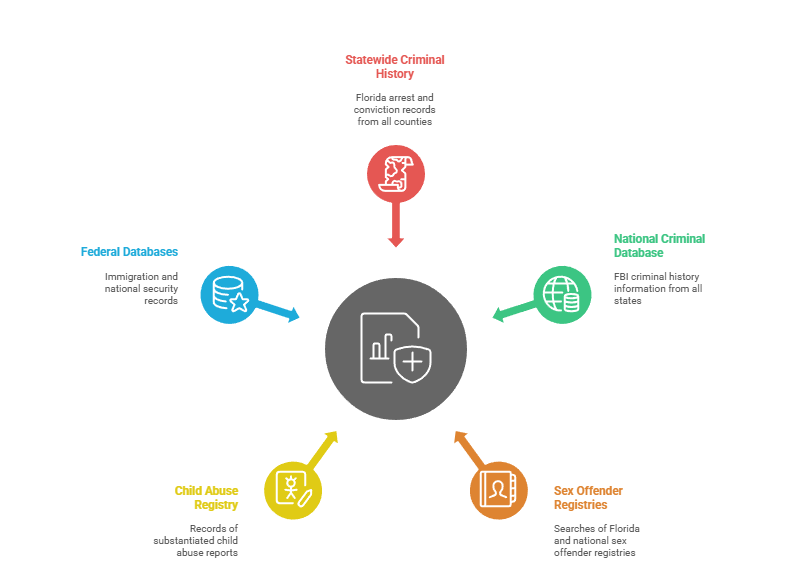
- Statewide Criminal History: Complete Florida arrest and conviction records from all 67 counties, including sealed or expunged records that remain visible to FDLE for employment screening purposes.
- National Criminal Database: FBI criminal history information from all 50 states, U.S. territories, and federal jurisdictions, capturing interstate offenses that might not appear in Florida records.
- Sex Offender Registries: Automated searches of Florida's Sexual Offender and Predator Registry, the National Sex Offender Public Website, and the National Crime Information Center's sex offender file.
- Child Abuse Registry: Florida Abuse Hotline Information System records identifying individuals with substantiated reports of child abuse, neglect, or abandonment.
- Federal Databases: Immigration and Customs Enforcement records, Department of Homeland Security watchlists, and Office of Foreign Assets Control screening for national security concerns.
Results are delivered through the FDLE Clearinghouse, a secure online portal accessible only to authorized district personnel. Districts receive either immediate clearance or detailed reports requiring human review. The Clearinghouse automatically retains all screening records for compliance monitoring.
Step-by-Step Background Check Process for Florida Teachers

The teacher background screening process follows a standardized protocol designed to balance thoroughness with reasonable timeframes. Understanding each phase helps hiring managers plan recruitment timelines. The typical process spans from one to three weeks from application to final clearance.
School districts must use FDLE-approved channeling agencies to submit fingerprints and initiate background checks. Florida has transitioned primarily to electronic fingerprinting, which offers faster processing and higher accuracy. Candidates cannot submit background checks independently. The employing district must initiate the process through its designated vendor.
Initial Application and Documentation
The background check process begins when a school district extends a conditional offer of employment. The district provides instructions for scheduling a fingerprinting appointment with the approved vendor. Candidates receive a unique transaction control number (TCN) that links the screening to the specific position. Valid government-issued photo identification matching the application name is required.
First-time applicants should prepare several key documents:
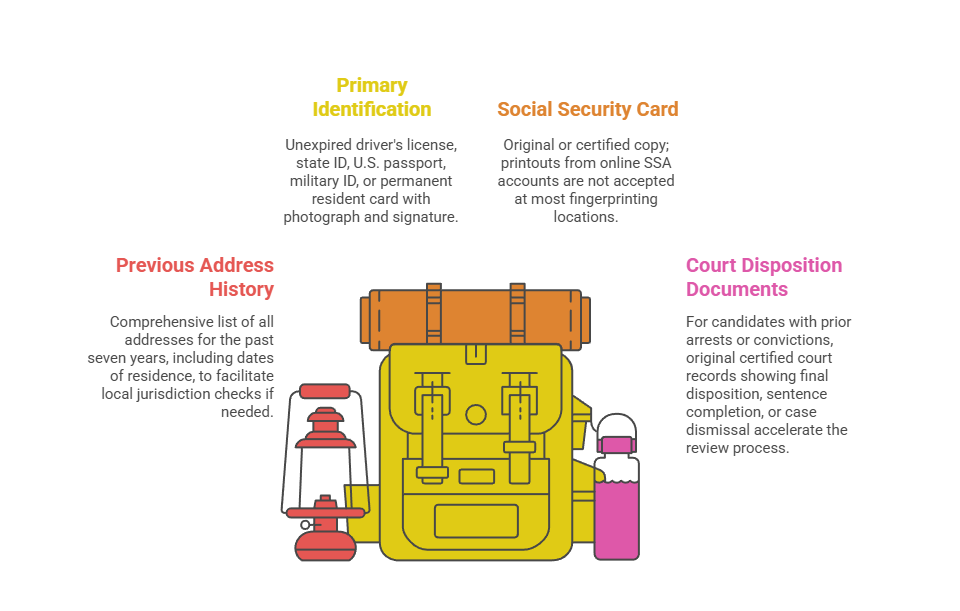
- Primary Identification: Unexpired driver's license, state ID, U.S. passport, military ID, or permanent resident card with photograph and signature.
- Social Security Card: Original or certified copy; printouts from online SSA accounts are not accepted at most fingerprinting locations.
- Previous Address History: Comprehensive list of all addresses for the past seven years, including dates of residence, to facilitate local jurisdiction checks if needed.
- Court Disposition Documents: For candidates with prior arrests or convictions, original certified court records showing final disposition, sentence completion, or case dismissal accelerate the review process.
Payment typically ranges from $75 to $95 depending on the screening package. Most districts handle costs for employees through district accounts. Substitute teachers may be responsible for initial screening costs. Fingerprinting appointments typically last 15-20 minutes.
Fingerprinting and Submission
Electronic fingerprinting technology has significantly improved the accuracy and speed of Florida teacher background checks. The process uses optical scanners to capture high-resolution digital images of all ten fingerprints. The system provides immediate quality feedback, allowing technicians to recapture any prints that don't meet FBI standards.
During the fingerprinting appointment, technicians verify the candidate's identity by comparing photo identification to the person present. The captured fingerprints are electronically transmitted directly to FDLE within minutes of completion. Candidates receive a receipt with their TCN for tracking purposes.
Processing Timeline and Status Monitoring
FDLE background checks submitted electronically typically process within 3-5 business days for candidates with no criminal history. The FBI component usually completes within 24-48 hours. School districts receive results through the FDLE Clearinghouse as soon as processing completes.
For candidates with criminal histories, processing extends to 2-4 weeks as FDLE staff conduct manual reviews. The agency must verify whether offenses meet disqualifying criteria under Florida law. Candidates can expedite this process by proactively providing certified court records at the time of fingerprinting.
Districts and candidates can monitor screening status through several channels:
- FDLE Clearinghouse Portal: Authorized district personnel access real-time status updates, estimated completion dates, and alerts for screenings requiring additional information or documentation.
- Vendor Tracking Systems: Most fingerprinting vendors provide online status checking using the transaction control number, showing when prints were captured, transmitted, and received by FDLE.
- District HR Contacts: Candidates should maintain communication with their hiring manager or HR representative, who receives direct notification when results are available and can provide guidance on next steps.
Processing delays most commonly occur during peak hiring periods from May through August. Technical issues such as fingerprint quality problems can also extend timelines. Candidates should complete fingerprinting as early as possible in the hiring process.
Disqualifying Offenses and Review Procedures
Florida law establishes clear categories of criminal offenses that impact eligibility for teaching positions. These range from absolute disqualifiers to reviewable offenses subject to district discretion. Understanding these categories helps hiring managers make informed decisions. The state's approach balances student safety imperatives with recognition that not all criminal histories present ongoing risk.
The Florida Department of Education maintains a public database of individuals disqualified from educational employment. This registry includes both permanent disqualifications and temporary restrictions. Districts must verify applicants against this database before extending offers.
Permanently Disqualifying Convictions
Florida Statute 1012.315 identifies specific offense categories that permanently prohibit employment involving student contact. These disqualifying convictions reflect offenses that demonstrate fundamental incompatibility with educational roles. Courts have consistently upheld these restrictions against legal challenges.
The following offense categories create absolute employment bars:
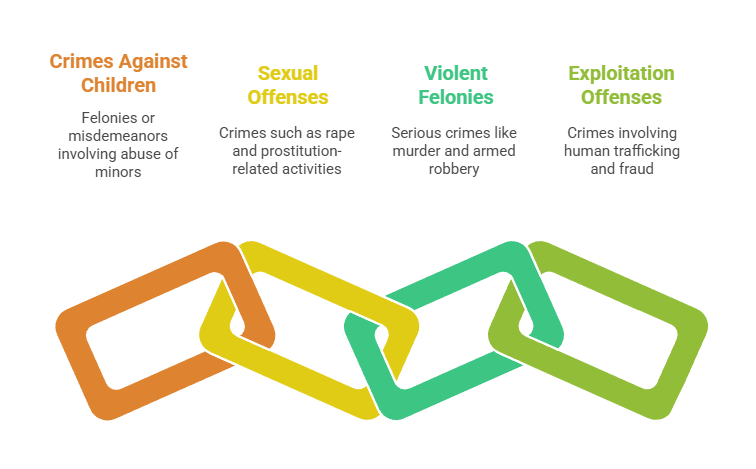
- Crimes Against Children: Any felony or misdemeanor involving physical or sexual abuse of a minor, including lewd or lascivious conduct, child molestation, contributing to the delinquency of a minor, or possession/distribution of child sexual abuse material.
- Sexual Offenses: Rape, sexual battery, sexual assault, prostitution-related crimes, indecent exposure, voyeurism, or any offense requiring sex offender registration under Florida or federal law.
- Violent Felonies: Murder, manslaughter, kidnapping, armed robbery, aggravated assault or battery, arson, and terrorist threats or acts.
- Exploitation Offenses: Human trafficking, exploitation of elderly or disabled persons, mortgage fraud targeting vulnerable populations, and organized fraud schemes.
Districts have no discretion to waive these permanent disqualifications. Candidates with permanently disqualifying convictions should not pursue Florida teaching positions. Some districts may permit employment in roles without student contact, but these positions require separate analysis.
Reviewable Offenses Subject to District Determination
Beyond permanent disqualifiers, Florida law identifies offense categories that trigger mandatory district-level review. School boards maintain discretion to evaluate these offenses in context. This tiered approach recognizes that blanket exclusions would unnecessarily restrict the talent pool.
District review processes typically evaluate several factors:
- Time Elapsed: Offenses occurring more than seven years prior receive more favorable consideration, particularly for non-violent crimes.
- Age at Offense: Crimes committed when the candidate was under 21 or during college years may be viewed more leniently, especially if followed by years of law-abiding behavior.
- Offense Pattern: Single incidents are distinguished from patterns of repeated criminal behavior, with isolated offenses receiving more sympathetic review.
- Rehabilitation Evidence: Completion of court-ordered programs, community service, counseling documentation, reference letters, and sustained employment history demonstrate reform.
Common reviewable offenses include DUI convictions more than five years old without subsequent incidents. Misdemeanor theft or fraud also falls into this category. Simple assault or battery without weapons receives individual review. Candidates with reviewable offenses should proactively prepare explanatory statements demonstrating rehabilitation.
Out-of-State Convictions and Sealed Records
Florida's background check system captures criminal history from all U.S. jurisdictions through FBI database integration. Out-of-state convictions receive the same scrutiny as Florida offenses. The FDLE evaluates whether crimes would constitute disqualifying offenses under Florida law.
Candidates with out-of-state criminal histories should understand that Florida law governs the evaluation. A misdemeanor in another state may be treated as a felony in Florida if the conduct would constitute a felony under Florida Statutes. Florida recognizes expungements from other states for public disclosure purposes. However, FDLE background checks can access sealed records through law enforcement channels. Candidates cannot legally deny expunged convictions when asked during the hiring process for school positions.
Special Categories and Exemptions
Florida's teacher background check requirements extend beyond traditional classroom teachers to virtually anyone with potential student contact. The state's comprehensive approach reflects lessons learned from incidents where individuals in peripheral roles exploited access to harm students. Recent legislative updates continue expanding the scope of required screenings.
Districts must maintain current documentation demonstrating compliance across all personnel categories. During audits conducted by the Florida Department of Education, reviewers examine hiring files and volunteer authorization records. Non-compliance findings can result in financial penalties and corrective action plans.
Substitute Teachers and Part-Time Staff
Substitute teachers face identical background check requirements as full-time instructional staff. No abbreviated or expedited screening process exists regardless of anticipated work frequency. Districts must complete Level 2 FDLE background checks before any classroom assignment.
Substitute teacher background checks remain valid as long as the individual maintains continuous registration with a district. Gaps in registration exceeding 90 days require new background screenings. Many districts have shifted to regional substitute pools to manage this process efficiently.
Part-time instructional staff require the same Level 2 screening as full-time personnel. This includes after-school program instructors and tutors employed by the district. Frequency of student contact is irrelevant to the screening requirement.
Volunteers and Parental Involvement
Florida law requires Level 2 background checks for all school volunteers who will have direct, unsupervised student contact. This includes classroom helpers, field trip chaperones, and athletic coaches. The definition of "unsupervised contact" has been interpreted broadly to include situations where a teacher is present but not actively monitoring all interactions.
Districts have some flexibility in structuring volunteer screening programs:
- Tiered Volunteer Categories: Many districts create multiple volunteer classifications with different screening requirements, with Tier 1 volunteers requiring only local background checks and Tier 2 volunteers needing full Level 2 FDLE screening.
- Annual vs. Multi-Year Clearances: While employee screenings remain valid for five years, districts may require more frequent volunteer rescreening, particularly for parents who volunteer irregularly.
- Expedited Parent Programs: School districts can establish streamlined processes for parent volunteers, including dedicated fingerprinting events held at schools, district-subsidized screening costs, and priority processing during peak volunteer seasons.
The cost considerations for volunteer screening create challenges for districts seeking robust parent involvement. Some districts absorb all costs as an investment in school community engagement. Others require volunteers to pay fees, which can create socioeconomic barriers.
Contractors and Vendors
Third-party contractors providing services on school campuses face background check requirements that vary based on student contact potential. Florida regulations distinguish between contractors who work in student-accessible areas during school hours versus those providing after-hours maintenance. This risk-based approach balances practical campus operations with student safety priorities.
The following contractor categories require Level 2 FDLE background checks:
- Direct Service Providers: Mental health counselors, speech therapists, occupational therapists, physical therapists, and nurses employed by contracted agencies rather than directly by districts.
- Technology Personnel: Educational software trainers who interact with students, IT technicians who work in classrooms during instructional time, and assistive technology specialists who provide direct student support.
- Facilities Staff: Contractors performing maintenance, repairs, or construction in occupied buildings during school hours, particularly those working near restrooms, locker rooms, or isolated areas.
- Transportation Providers: Bus drivers, van operators, and transportation aides employed by contracted services rather than directly by districts, subject to additional commercial driver background checks.
- Food Service Workers: Contracted cafeteria staff who interact with students during meal periods, though some districts require screening only for supervisory personnel while exempting line workers.
Responsibility for conducting background checks typically falls on the contracting company rather than the school district. However, districts must verify compliance before allowing campus access. Contracts should explicitly require proof of FDLE background check completion for all personnel who will have student contact.
Reciprocity, Transfers, and Rescreening Requirements
Florida's position as a high-growth state raises important questions about background check reciprocity and out-of-state screenings. The state's approach prioritizes comprehensive, Florida-specific vetting over efficiency. Even experienced teachers relocating from other states must complete full FDLE background checks. This policy reflects the reality that screening standards vary significantly across states.
Understanding the distinction between certification reciprocity and background check reciprocity is critical. Florida participates in interstate teaching license agreements that facilitate certification transfer. However, these certification provisions do not extend to background check requirements. A teacher holding a valid certificate in another state may transfer their credential but must still complete a Florida background check.
Out-of-State Teacher Requirements
Teachers relocating to Florida from other states frequently assume that recent background checks will satisfy Florida requirements. Florida law provides no reciprocity based on out-of-state background checks. This requirement applies equally to teachers from states with rigorous screening programs.
Out-of-state teachers should anticipate several requirements:
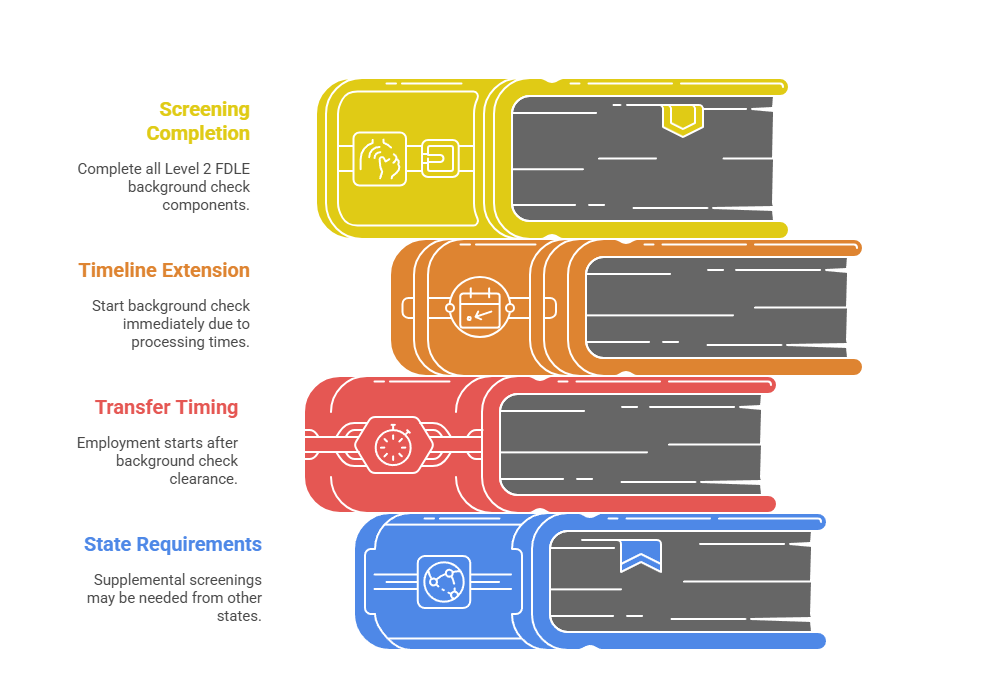
- Complete Florida Screening: All components of the Level 2 FDLE background check must be completed, including new fingerprinting specific to Florida's system.
- Extended Timeline: Teachers relocating from other states should begin the background check process immediately upon accepting Florida positions, as processing may take longer for candidates with residences in multiple states.
- Certification Transfer Timing: While Florida's Bureau of Educator Certification can process license transfers relatively quickly, employment cannot commence until background clearance is received.
- Additional State Requirements: Teachers from outside the southeastern United States may need supplemental screenings from all states where they've resided, particularly if they lived in states for significant periods within the past seven years.
Some interstate compacts have advocated for national background check clearinghouse systems. These proposals have gained traction in response to nationwide teacher shortages. However, as of 2025, no such system has been implemented.
District Transfers and Continuing Employees
Teachers transferring employment between Florida school districts benefit from partial reciprocity through the FDLE Clearinghouse system. When a teacher with a current, valid Florida background check moves districts, the receiving district can access existing screening results. This process significantly expedites hiring for inter-district transfers.
However, districts must verify that the previous screening meets current standards and remains within the five-year validity period. Background checks completed more than five years ago require updating. Some districts implement more frequent rescreening schedules as a matter of local policy. Teachers should verify the rescreening policy of any district they're considering.
The Rap Back system provides continuous monitoring of Florida teachers' criminal activity between scheduled rescreenings. This real-time notification system enables districts to take immediate action when employees are arrested. Rap Back enrollment occurs automatically when teachers complete FDLE background checks.
Five-Year Rescreening Protocols
Florida Statutes require rescreening of all instructional personnel at least once every five years. This rescreening includes complete Level 2 FDLE background checks identical to initial employment screening. Districts must track rescreening due dates for all employees.
| Rescreening Component | Implementation Method |
| Automated Tracking Systems | Modern HR systems flag employees approaching rescreening deadlines and generate notification letters |
| Employee Notification Timelines | Best practice involves notifying employees 90 days before deadlines with follow-up reminders at 60 and 30 days |
| Expired Clearance Protocols | Districts establish clear policies involving administrative leave without pay until updated results are received |
Failure to maintain current background clearances ranks among the most common compliance violations. Districts found with expired clearances face per-employee fines and corrective action requirements. Several districts have faced six-figure penalties in recent years for systematic failures.
Compliance, Documentation, and Record Retention
Maintaining comprehensive documentation of background check compliance constitutes a critical district responsibility. Florida law requires districts to retain proof of completed background checks. Systems must create audit trails demonstrating that screenings occurred before student contact began. The Florida Department of Education conducts regular compliance audits.
The legal and financial consequences of non-compliance have escalated significantly in recent years. Districts can no longer treat background check requirements as administrative formalities. State education officials now view screening compliance as a fundamental student safety obligation.
District Compliance Obligations
School districts bear primary responsibility for ensuring all employees, volunteers, and contractors have completed required background checks before student contact. This obligation cannot be delegated to employees themselves or vendors. District superintendents and school board members can face personal liability for knowing or reckless disregard of requirements.
Comprehensive compliance programs typically include several elements:
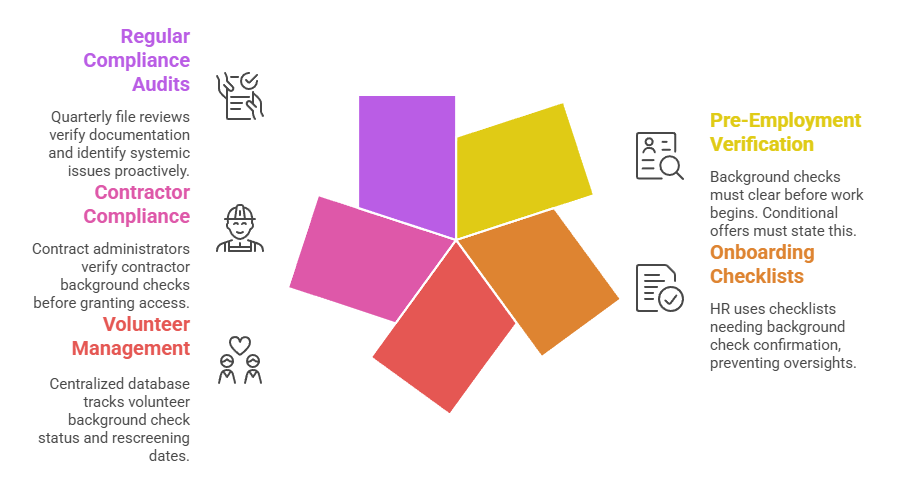
- Pre-Employment Verification: No employee may begin work or have student contact before background check clearance is documented in personnel files; conditional offers must explicitly state this requirement.
- New Hire Onboarding Checklists: HR departments should use standardized checklists that cannot be completed without background check confirmation, preventing administrative oversights.
- Volunteer Management Systems: Centralized databases tracking volunteer applications, background check status, approval dates, and expiration dates for rescreening management.
- Contractor Compliance Verification: Contract administrators must collect and verify background check documentation for all contractor personnel before campus access is granted.
- Regular Compliance Audits: Internal quarterly reviews of randomly selected personnel files to verify proper documentation and identify systemic issues before state audits occur.
Many districts have adopted "no clearance, no keys" policies. New employees receive building access credentials only after HR confirms completed background checks. This operational control prevents non-compliant practices like allowing new teachers to set up classrooms while checks are pending.
Record Retention and Audit Preparation
Florida administrative rules require retention of background check documentation for the duration of employment plus seven years. This extended retention period supports potential investigations into misconduct allegations. Districts must maintain both original background check results and evidence of when results were received.
Personnel files should contain comprehensive background check documentation:
- Initial Screening Results: Complete FDLE background check results as received through the Clearinghouse, including the transaction control number and date results were accessed by district personnel.
- Conditional Offer Letters: Dated employment offers explicitly stating that employment is contingent upon satisfactory background check completion, establishing the proper sequence of offer-then-screen.
- Start Date Documentation: Evidence of the employee's actual first day of work and first date of student contact, demonstrating that these occurred after background clearance was received.
- Rescreening Records: Documentation of all subsequent five-year rescreenings, showing continuous maintenance of clearance throughout employment.
- Review Documentation: For employees with criminal histories requiring district-level review, records of the review process, considerations evaluated, and final determination rationale.
During Florida Department of Education audits, reviewers select random samples of employee files and verify required documentation. Common audit findings include missing background check results and inadequate documentation of timing. Districts should conduct mock audits using the same protocols state reviewers employ.
Penalties for Non-Compliance
Florida has significantly strengthened penalties for background check non-compliance over the past five years. The state's approach now combines financial penalties, administrative sanctions, and potential criminal liability. These enhanced consequences reflect legislative intent to ensure districts treat compliance as non-negotiable.
Current penalty structures include several consequences. Financial penalties reach up to $5,000 per individual employed without proper background screening. State funding consequences can trigger withholding of education funding until corrective action plans are implemented. Individual administrator liability means superintendents and principals who knowingly permit unscreened individuals to have student contact may face personal criminal misdemeanor charges. Professional certification impact allows disciplinary action against educators holding Florida certificates. Civil liability exposure increases when unscreened employees harm students.
The 2024 case of a Central Florida district illustrates current enforcement approaches. The district paid $15,000 in state fines and implemented a court-monitored corrective action plan. The superintendent resigned under pressure. One unscreened teacher was subsequently arrested for an offense that proper screening would have revealed.
Conclusion
Florida's comprehensive teacher background check system represents the state's commitment to student safety through rigorous screening of all education personnel. The Level 2 FDLE background check requirement creates significant safeguards by examining criminal histories, sex offender registries, and abuse databases before individuals gain student access. Recent legislative updates have expanded screening scope to address emerging vulnerabilities in digital education environments and closed loopholes that previously allowed gaps in coverage. Compliance with these requirements demands systematic documentation, proactive rescreening management, and clear understanding of disqualifying offenses versus reviewable criminal histories that permit district discretion.
Frequently Asked Questions
How long does a Florida teacher background check take?
Electronic FDLE Level 2 background checks typically process within 3-5 business days for candidates with no criminal history. Cases requiring manual review can take 2-4 weeks. Peak hiring periods from May through August may experience longer processing times. Candidates should complete fingerprinting early after receiving conditional employment offers to minimize delays.
Can I teach in Florida with a DUI conviction?
DUI convictions do not automatically disqualify candidates from teaching in Florida. Districts review DUI offenses individually, considering time elapsed since conviction, number of offenses, and evidence of completed treatment programs. Recent DUIs within 5 years or multiple convictions typically result in rejection, while single incidents more than 7 years old often receive favorable consideration.
Do Florida teaching background checks expire?
Yes, Florida teacher background checks must be renewed every five years throughout employment. Districts track rescreening due dates and initiate new Level 2 FDLE background checks before current clearances expire. Teachers cannot continue in positions with student contact after their background clearance expires. The Rap Back system provides continuous monitoring between rescreenings but does not eliminate the five-year renewal requirement.
Are out-of-state background checks accepted in Florida?
No, Florida does not accept background checks conducted by other states as substitutes for FDLE Level 2 screening. All teachers hired in Florida must complete Florida-specific background checks regardless of recent screening in other states. Florida's interstate teaching certification reciprocity does not extend to background check requirements. Credential transfer and employment screening are separate processes with distinct requirements.
How much do Florida teacher background checks cost?
Florida teacher background checks typically cost between $75 and $95, including fingerprinting and FDLE processing fees. Most school districts pay these costs for employees as part of the hiring process. Substitute teachers and contractors may be responsible for their own screening costs depending on policies. Some districts reimburse candidates for background check expenses after successful employment.
What shows up on a Florida teacher background check?
FDLE Level 2 background checks include comprehensive criminal history from Florida and all other states, FBI fingerprint database results, and sex offender registry searches at state and national levels. Florida child abuse and neglect registry records and federal watchlist screening are also included. Sealed and expunged records remain visible to FDLE for educational employment screening. Arrests without convictions appear in results and require explanation.
Can I start teaching while my background check is pending?
Florida districts may extend conditional employment offers while background checks are processing, but candidates cannot have unsupervised student contact until final clearance is received. Some districts allow new teachers to attend training or complete onboarding paperwork with supervision while screening is pending. Direct student contact including classroom teaching is prohibited before background clearance is documented.
What happens if I fail a Florida teacher background check?
Candidates whose background checks reveal disqualifying convictions receive adverse action notices from the school district explaining the basis for denial. For permanently disqualifying offenses, no appeal process exists. Reviewable offenses subject to district discretion may be appealed through local school board processes. Candidates have rights to obtain copies of their results and dispute inaccurate information through FDLE.
Additional Resources
- Florida Department of Law Enforcement - Background Screening Overview
https://www.fdle.state.fl.us/Criminal-History-Records/Background-Screening.aspx - Florida Department of Education - Educator Certification
https://www.fldoe.org/teaching/certification/ - Jessica Lunsford Act - Full Text (Florida Statute 1012.465)
http://www.leg.state.fl.us/statutes/index.cfm?App_mode=Display_Statute&URL=1000-1099/1012/Sections/1012.465.html - Florida School Board Association - Employment Screening Resources
https://www.fsba.org/ - National Association of Professional Background Screeners - State Requirements
https://www.napbs.com/

GCheck Editorial Team
Meet the GCheck Editorial Team, your trusted source for insightful and up-to-date information in the world of employment background checks. Committed to delivering the latest trends, best practices, and industry insights, our team is dedicated to keeping you informed.
With a passion for ensuring accuracy, compliance, and efficiency in background screening, we are your go-to experts in the field. Stay tuned for our comprehensive articles, guides, and analysis, designed to empower businesses and individuals with the knowledge they need to make informed decisions.
At GCheck, we're here to guide you through the complexities of background checks, every step of the way.



